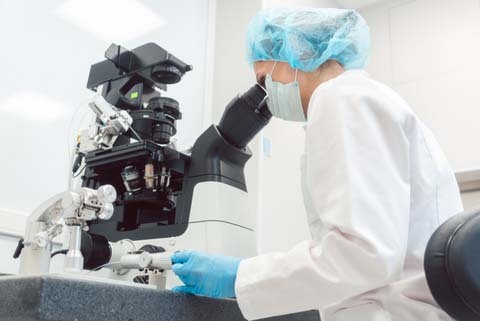Fertility Diagnostic Bloodwork and Hormonal Monitoring Services
Helping Customize Your Fertility Treatment
Diagnostic bloodwood and hormonal monitoring are important factors for many fertility treatments. Before fertility treatment starts, we will request some quick bloodwork and hormonal analysis to determine your body’s needs and the levels of reproductive hormones in your body. This information is valuable as it helps us create a custom plan for your fertility treatment.

Diagnostic Bloodwork & Hormonal Monitoring Process
The evaluation process includes examining levels of reproductive hormones such as estrogen, progesterone, luteinizing hormone (LH), follicle-stimulating hormone (FSH), and anti-Müllerian hormone (AMH). Discrepancies or abnormalities in hormone levels can indicate underlying reproductive issues, such as ovulatory dysfunction or ovarian reserve decline.
Examples of Common Tests and Procedures Used for Diagnosis:
- AMH (Anti Mullerian Hormone): AMH is a hormone that is excreted from antral follicles (fluid filled sacs that house eggs) in the ovaries. This gives an idea of what the egg reserve is.
- FSH (Follicle Stimulating Hormone): FSH is the hormone that stimulates the follicles (fluid filled sacs with eggs) to grow. It is released from the anterior pituitary gland in a pulsatile fashion throughout the cycle to help grow eggs. When drawn at the beginning of the menstrual cycle and compared with LH ratio, it also can give an indication about egg reserve and certain diagnoses such as PCOS. Though, AMH is the preferred method of testing for egg reserve.
- LH (Luteinizing Hormone): LH is the hormone that surges midcycle to stimulate the final maturation of the follicle and initiate ovulation. Similar to FSH, LH is released in a pulsatile manner from the anterior pituitary gland. It can be drawn with bloodwork in the middle of the cycle along with estradiol and progesterone to estimate ovulation timing.
- Prolactin: Prolactin is the hormone that is responsible for aiding in the development of breast tissue and milk production as well as playing a role in progesterone production after ovulation. Elevated prolactin can interfere with how progesterone is made after ovulation and cause issues such as a luteal phase defect. Prolactin can be elevated for a variety of reasons such as stress, prolactinomas, and lactation/breastfeeding. If prolactin is elevated outside of pregnancy and/or breastfeeding, it can be addressed with medication to maximize success of the cycle.
- TSH (Thyroid Stimulating Hormone): TSH is a hormone released from the pituitary gland that tells the thyroid to release hormones such as T4 (thyroxine) and T3 (triiodothyronine) to maintain many essential functions within the body. When TSH is too high or too low, it can interfere with the menstrual cycle in a variety of ways such as irregular ovulation. It is essential for TSH to also be monitored in pregnancy to help maintain a healthy pregnancy as the thyroid begins to work harder as the pregnancy continues to accommodate for the baby.
- Testosterone: Testosterone is an androgen or male sex hormone that is made in women at small amounts to assist in maintaining libido, mood and energy levels, and menstrual cycles. When testosterone is elevated, it can interfere with regularity of menstrual cycles and interfere with quality of ovulation. Elevated testosterone, in conjunction with other testing and clinical signs and symptoms, can assist with making diagnoses such as PCOS.
- SIS (Saline Infusion Sonography): SIS is a procedure performed in office where normal saline is administered into the uterine cavity and fallopian tubes concurrently with ultrasound to evaluate for structural soundness of the uterus and patency of the fallopian tubes.
Why is Hormone Monitoring During Fertility Treatment Important?
Hormonal monitoring, particularly tracking LH and progesterone levels, helps predict ovulation timing in individuals trying to conceive naturally or undergoing fertility treatments like timed intercourse or intrauterine insemination (IUI). By identifying the surge in LH that precedes ovulation and monitoring progesterone levels afterward, healthcare providers can determine the optimal timing for intercourse or insemination to maximize the chances of conception.

Enabling Effective Fertility Treatment
During fertility treatments such as ovarian stimulation for IVF or ovulation induction, regular bloodwork and hormonal monitoring are essential to assess the body\'s response to medication. Monitoring hormone levels and follicular growth via ultrasound scans helps healthcare providers adjust medication dosages and optimize treatment protocols to improve the chances of successful ovulation and egg retrieval.
Tracking Progress Throughout Your Fertility Journey
Following fertility treatment, monitoring hormonal levels like progesterone and human chorionic gonadotropin (hCG) helps confirm pregnancy. Rising levels of hCG, the hormone produced by the developing embryo, indicate successful implantation and pregnancy. Monitoring progesterone levels also helps ensure adequate support for the early stages of pregnancy until the placenta takes over hormone production.

